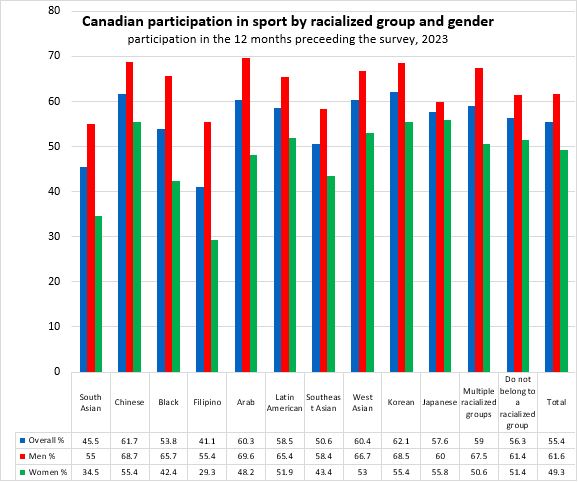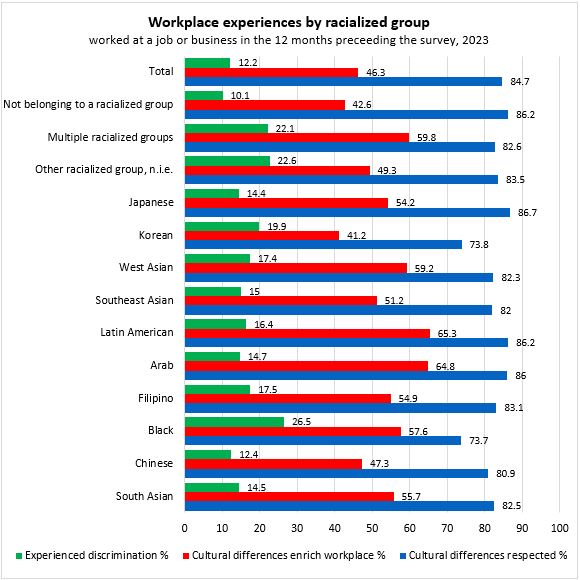The Economics and Statistics Division maintains archives of previous publications for accountability purposes, but makes no updates to keep these documents current with the latest data revisions from Statistics Canada. As a result, information in older documents may not be accurate. Please exercise caution when referring to older documents. For the latest information and historical data, please contact the individual listed to the right.
<--- Return to Archive
For additional information relating to this article, please contact:
October 23, 2023STUDY: PARTICIPATION IN CANADIAN SOCIETY THROUGH SPORT AND WORK Statistics Canada recently released an article describing data collected using the Survey Series on People and their Communities (SSPC). This release outlines Canadians participation in sport and their experiences at work, including differences across racialized groups.
The data show that in the 12 months preceding the survey, more than half (55%) of people aged 15 years and over participated in sport. Overall men were more likely to participate in sport than women, with 62% of men reporting participation compared to 49% of women. This difference held across most population groups, and was particularly pronounced for Filipino, Black, South Asian and Arab populations. Overall, Chinese and Korean populations were most likely to report participating in sport, for both men and women.

Among those who reported participation in sport, the most common type was swimming, followed by cycling and running. The popularity of different sports also varied across population groups. Swimming was the most common type of sport among the non-racialized population, while running was the most popular among many racialized populations. Soccer was also reported as another of the most popular sports. The Canadian-born population were more likely to have participated in winter sports such as ice hockey, skating, skiing or snowboarding compared to the immigrant population who were more likely to have played soccer, tennis or basketball.
Most people who participated in sport report playing recreationally (83%) instead of in a club or league. The largest motivating factor was cited as physical health and fitness, with 82% of those participating in sport citing this reason, followed by fun, recreation or relaxation (70%), mental health benefits (65%) and doing activities with friends (54%). Lack of interest (35%) was the most often cited reason for not playing sports, followed by time (33%) and age (24%). Cost of participating was cited as a barrier by 11% of people overall, but was higher among some racialized groups, including Koreans (20%), West Asians (20%) and Latin Americans (17%). Immigrants were more likely to cite lack or time (37%) and age (28%) as a barrier to participation compared to the Canadian-born population.
This survey also collected data on Canadians experiences at work. Close to half (46%) of those who worked over the previous 12 months felt that cultural differences enrich their workplace. Women were more likely to report this outcome than men. This was true among many racialized groups. Immigrants (54%) were also more likely to report feeling that cultural differences enriched their workplace than the Canadian-born population (43%).
Data shows that about 85% of people feel that cultural differences are respected in the workplace, while racialized (81%) groups were less likely than non-racialized (86%) groups to report this outcome. This was similar among Immigrant (82%) and Canadian-born (86%) populations.
Around 12% of people reported experiencing some unfair treatment or discrimination at the workplace. Among those reporting these experiences, treatment based on race or skin colour was the most common reason, followed by sex and age. Women were more likely than men to report unfair treatment or discrimination in the workplace. All racialized groups were more likely to report some type of unfair treatment than non-racialized people. The highest was among Black populations, where 26% reported experiencing unfair treatment or discrimination compared to the non-racialized population (10%). Immigrants were also more likely to report unfair treatment compared to the Canadian-born population (15% compared to 11%).

Source: Statistics Canada, Participation in Canadian society through sport and work
<--- Return to Archive